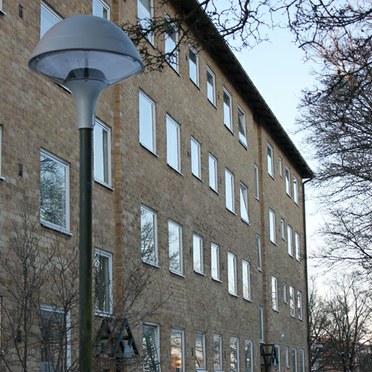MKB, Malmö, Sweden
- Lamp efficacy
Lamp efficacy
Ensuring the lamp efficiently converts electricity into light (lm/W).
- Ballast classification
Ballast classification
Controlling the electricity supply to the lamp (Energy Efficiency Index).
- Luminaire distribution
Luminaire distribution
Controlling light emission using optics which bend and shape the light to the correct location.
- System efficacy
System efficacy
Combining optical and thermal control within the luminaire (luminaire lm/W).
- Presence/absence detection
Presence/absence detection
Providing lighting only when it’s needed.
- Daylight detection
Daylight detection
Reducing waste light during daylight hours.
- Constant illuminance
Constant illuminance
Producing the correct lighting levels for the duration of the maintenance period.
- Task-scene setting
Task-scene setting
Allowing the user to set scenes and adapt the lighting to different tasks.
- Timed off
Timed off
Automatic cut-off to turn all lights off during unoccupied hours.
- Task lighting
Task lighting
Lighting task areas with the correct amount of light.
- Zoning of lighting
Zoning of lighting
Zoning lighting in accordance to occupancy patterns or window location.
- Maintenance schedule
Maintenance schedule
Tailoring maintenance schedules in accordance to product age, performance and environment.
- Waste light
Waste light
Eliminating waste light which does not hit the intended target.
- Reflectance
Reflectance
Taking advantage of light which is reflected from the surface within the space.
- Visible smart metering
Visible smart metering
Enabling results of actions to be quickly seen as increased or decreased energy use to encourage responsible energy consumption.
Malmö's largest real estate company invests in Plurio LED to reduce energy consumption by up to 70%
MKB is Malmö's largest real estate company with 22,539 apartments and 1,100 commercial premises across Sweden. Care for the environment is an integral part of its management programme and great efforts are being made to reduce overall consumption of electricity, heat and water - without any impact on resident comfort. Migration from mercury opal sphere to Plurio LED
In light of the EU's Ecodesign Directive, mercury light sources will be phased out after 2015. MKB has therefore chosen to replace its existing installation of 80W mercury lamps with post top Plurio LED(40W) lanterns including Bi power dimming. The Plurio LED fittings are supplied complete with 4-meter cable, which facilitates the exchange of already existing poles.
Up to 70% energy savings
The installation saves approximately €6250, 16kWh and the equivalent of 650kg of CO2 per year. Combined with the Bi power night time dimming switch, which reduces energy consumption by 50% for eight hours, total energy savings are as much as 70%. The savings are considerable but not taken in isolation from other benefits. The quality of light is now much better with crisp, clean white light and good colour rendering too.
Just a 4-year payback period
The through life cost also offers a marked improvement, given that the mercury lamps required regular maintenance and lamp replacement. Looking at the installation cost, capital purchase price and maintenance required, we can clearly see the benefits of replacing these lanterns with a payback of just over 4 years (Figure 1).*
Increased resident security
Plurio LED is available with both symmetrical and asymmetrical light distribution. The asymmetric variant offers the opportunity to reduce glare when close to buildings. MKB however has chosen the symmetric variant with an even distribution of light, illuminating both walkways and adjacent surfaces to help increase security.
The residents in the area are now enjoying the new lighting. Michael Siecke, Purchaser at MKB, and caretaker Tord Brink are pleased with both the fittings and expected energy savings. With the LED's increased lifetime, they also look forward to reduced operating and maintenance costs.
*This case study assumes some form of maintenance is carried out and that components fail at industry average times. Each visit to a lantern needs two people and also requires a vehicle to access the lanterns. Plurio lanterns are installed at a unit cost of about €500 per lantern and are assumed to be replaced at the same cost when the lanterns reach 70% lumen output. In reality the cost of LED lanterns will have reduced by the time these lanterns need replacing, so the through life costs are likely to be more favourable to Plurio than shown.

